Giulietta e Romeo (Vaccai) on:
[Wikipedia]
[Google]
[Amazon]
 ''Giulietta e Romeo'' (''Juliet and Romeo'') is an
''Giulietta e Romeo'' (''Juliet and Romeo'') is an
Del Teatro (in Italian)
{{Portal bar, Opera 1825 operas Italian-language operas Operas Operas by Nicola Vaccai Operas based on Romeo and Juliet Libretti by Felice Romani
 ''Giulietta e Romeo'' (''Juliet and Romeo'') is an
''Giulietta e Romeo'' (''Juliet and Romeo'') is an opera
Opera is a form of theatre in which music is a fundamental component and dramatic roles are taken by singers. Such a "work" (the literal translation of the Italian word "opera") is typically a collaboration between a composer and a libr ...
in two acts by the Italian composer Nicola Vaccai
Nicola Vaccai (15 March 1790 – 5 or 6 August 1848) was an Italian composer, particularly of operas, and a singing teacher.
Life and career as a composer
Born at Tolentino, he grew up in Pesaro, and studied music there until his parents sent him ...
. The libretto
A libretto (Italian for "booklet") is the text used in, or intended for, an extended musical work such as an opera, operetta, masque, oratorio, cantata or musical. The term ''libretto'' is also sometimes used to refer to the text of major li ...
, by Felice Romani
Giuseppe Felice Romani (31 January 178828 January 1865) was an Italian poet and scholar of literature and mythology who wrote many librettos for the opera composers Donizetti and Bellini. Romani was considered the finest Italian librettist betw ...
, is based on the tragedy of the same name by Luigi Scevola and, ultimately, on the 1530 novella of the same name by Luigi Da Porto. It was first performed at the Teatro alla Canobbiana, Milan, on 31 October 1825. It was Vaccai's last major success, although he wrote another nine operas,Loewenthal 1978, columns 697–698. and is rarely performed in its full version today.
The opera was also first performed in Barcelona on 26 May 1827, Paris on 11 September 1827, Lisbon in the autumn of 1828, London on 10 April 1832, and Mexico in July 1841. It was first performed in Graz
Graz (; sl, Gradec) is the capital city of the Austrian state of Styria and second-largest city in Austria after Vienna. As of 1 January 2021, it had a population of 331,562 (294,236 of whom had principal-residence status). In 2018, the popula ...
(in a German translation by I. C. Kollmann) on 12 October 1833 and Budapest (also in Kollmann's translation) on 31 July 1845.
On 27 October 1832, during a performance of Bellini's '' I Capuleti e i Montecchi'' in Bologna, the next to last scene of Vaccai's opera was substituted for the last act of the Bellini opera. This was done at the request of the Romeo, Maria Malibran
Maria Felicia Malibran (24 March 1808 – 23 September 1836) was a Spanish singer who commonly sang both contralto and soprano parts, and was one of the best-known opera singers of the 19th century. Malibran was known for her stormy personality ...
, and became frequent practice during the remainder of the 19th century. It was almost always done this way in Italy, and in this guise this portion of Vaccai's opera continued to be performed up to as late as 8 September 1897, when it was presented in this manner in Hamburg.Loewenthal 1978, column 725.
Roles
References
Notes Sources *Loewenberg, Alfred (1978). ''Annals of Opera 1597–1940'' (third edition, revised). Totowa, New Jersey: Rowman and Littlefield. .Further reading
Del Teatro (in Italian)
External links
*{{Portal bar, Opera 1825 operas Italian-language operas Operas Operas by Nicola Vaccai Operas based on Romeo and Juliet Libretti by Felice Romani